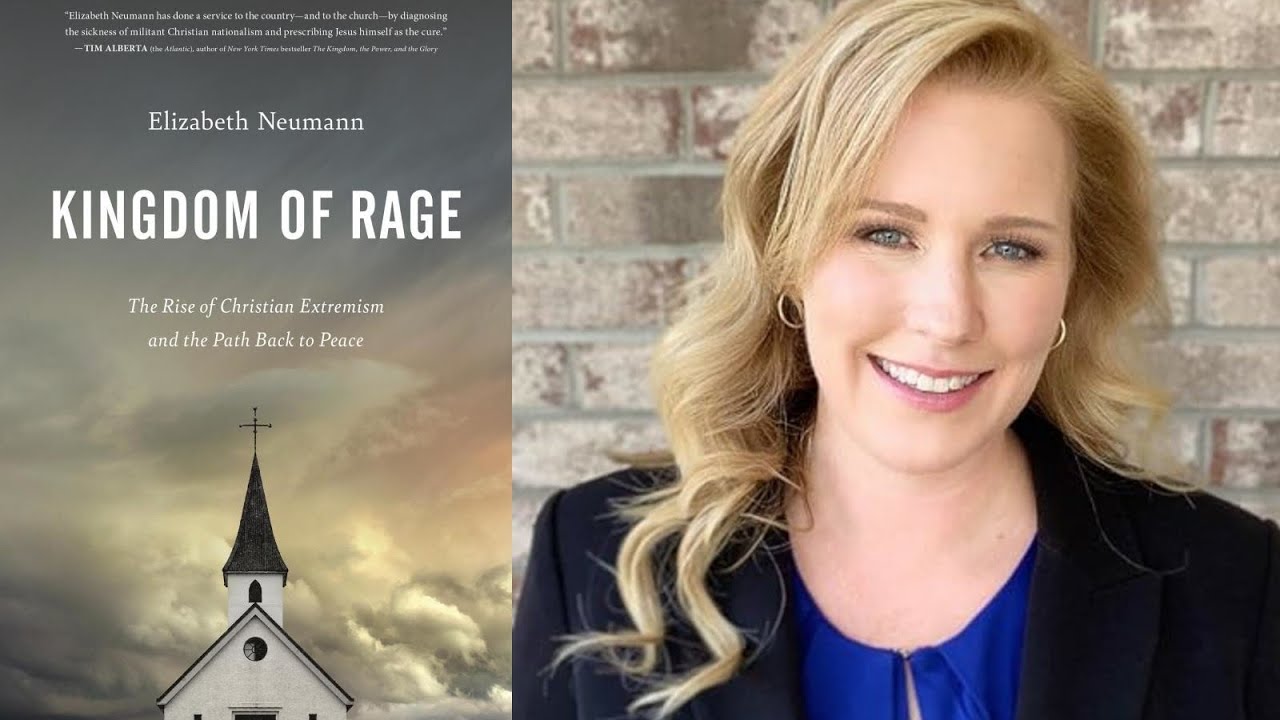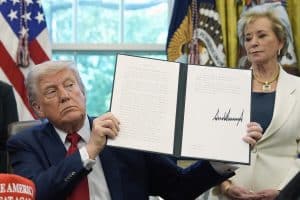The 9/11 attacks on the United States revealed Elizabeth Neumann’s first calling: to protect the nation from religious extremists “over there” through counterterrorism work in George W. Bush’s administration. The 1/6 attack on the U.S. Capitol inspired her current calling: to help America and its churches protect themselves from the dangers of religious extremists right here.
The January 6 attack also began her long and painful process of “deconstructing my politics from my faith,” she says.
As she writes in her informative, insightful, frightening and ultimately inspiring book, Kingdom of Rage: The Rise of Christian Extremism and the Path Back to Peace: “I watched people from my community complete their rage-fueled metamorphosis into violent extremists. It was an evolution aided and abetted by a church that has lost its soul: living in fear, glorifying false notions of our country’s past, idolizing earthly tools of power as the source of their salvation, and actively contributing to the dehumanizing and apocalyptic narratives inciting violence.”
In an interview with BNG, Neumann put it more bluntly: “My community is the greatest source of domestic danger.”
After 9/11, American Muslims were challenged to speak out if they disagreed with the extremist ideologies espoused by some of their faith’s leaders. Neumann felt she needed to do the same about rhetorical bomb throwers quoting the Bible.
She expresses “deep disappointment and depression” over seeing fellow evangelical Christians embrace and fuel extremism rather than resist it and heal its destructive effects.
But she finds hope and encouragement in her new work: She talks to churches and fellow politically homeless believers about how extremism lures vulnerable people and helps them save those who have been drawn down rabbit holes by its dark allure.
The structure of her book demonstrates her pastoral purpose. After laying out the causes and dangers of extremism, she focuses on her primary task: practical suggestions and tools readers can use to identify extremism in themselves and their communities, how to talk to others about it and rescue those drowning in it.
In the book, she blames today’s rise in extremism on herself and the grievance-filled evangelical subculture that formed her:”
We must start by acknowledging where we have failed. For too long, conservativism, Republicans and American Christianity have tolerated extremism.
We tolerated all the precursor steps: the us-versus-them framing, the scapegoating and pushing out moderate in-group voices, even to the point of demonizing those who called us to follow the ways of Jesus and not politicians.
INTERVIEW: Robert P. Jones Exposes the Disturbing Links Between Christian Nationalism and White Supremacy
We tolerated conspiracy theories. … We tolerated media personalities and politicians who claimed to be Christians but trafficked in extremist language and calls for violence. … We tolerated extremism because what we really worshipped was power, control, comfort or significance. We tolerated extremism because we felt like we deserved the American dream and did not want to do anything that might disrupt it.
As a believer, Neumann is profoundly sad to see a generation forsaking the church’s historic mission and spiritual resources, turning instead to would-be political saviors and worn-out ideologies that promise speedy solutions to the challenges of daily life.
“The proximity between evangelical Christianity and right-wing extremism in our time is both a heretical aberration of the true gospel and a natural progression of the corrupt leaders and structures within evangelical Christianity that have allowed the church to be exploited and abused,” she writes.
She says Christian leaders who cultivate followings rather than shepherd the flock have deceived their followers, making them vulnerable to extremism, manipulation and corruption.
As a former assistant secretary for counterterrorism and threat prevention at the U.S. Department of Homeland Security, Neumann sounds the alarm, warning that religious-inspired terrorism is the deadliest form, whether it’s under the banner of Allah or Jesus: “The most dangerous extreme of nationalism is when it merges with arguments that a nation’s religion, ethnicity or race must be protected from being polluted by outsiders — often framed as less-than-human invaders.”
Hard-core American Christian extremism may attract only a small percentage of citizens, but Neumann warns their numbers are growing and the ideology is particularly toxic.
“Christian extremism is the collision of these white power and antigovernment ideologies — widely considered over the last fifty years to be fringe — with a mainstream and arguably dominant cultural force of nationalism and evangelicalism,” she writes. “It is this particular intermingling of world views that makes Christian extremism so uniquely troubling and so uniquely dangerous.”
READ: Christian Nationalists Are Trying to Gaslight You
Neumann said in her interview that the us-versus-them culture war rhetoric absorbed by many evangelicals over the past half century provides many on ramps to extremism.
“The problem arises when a group begins constructing narratives about an out-group’s opposition to them,” she says. “They define the out-group’s beliefs, traits and practices, relying on information that may be unreliable, exaggerated or based solely on an in-group member’s negative experience with the out-group. They perceive the out-group poses a threat to them. Extremism sets in when the in-group adopts hostile attitudes toward the out-group.”
Citing a 2018 Southern Baptist Convention study, Neumann said racist traditions within the SBC didn’t die off after the slave-owning founders of its first theological seminary passed away. These racist SBC traditions helped perpetuate the Lost Cause myth in the aftermath of the Civil War, helped mainstream support for the Ku Klux Klan, and today lend support to virulent white supremacist ideologies and groups, she charges.
“Making ourselves aware of these ideologies and how they pervert Christianity and leverage conspiracy theories and the political system is an important way we can help stop the spread of extremism,” she writes.
Neumann says Christian patriots who are crusading to save America are actually killing it, plus they’re confusing believers about what following Jesus means and offers.
Other trends worry Neumann:
– “Catastrophizing rhetoric” from Rod Dreher and others that promotes extremism.
– “The increase in rhetoric from politicians suggesting that the federal government is being weaponized against Republicans or against the American people continues to drive antigovernment sentiment.” Exhibit A for this could be House Speak Mike Johnson calling Donald Trump’s New York trial a politically motivated “sham.”
– The “idolatry” of Christian nationalism: “Where the Christian faith should be a protective factor for someone experiencing uncertainty or a life crisis, instead it creates an ideology that justifies the need for hostile action.”
Still, she can’t shake her transcendental hope. Things may be bad, she writes: “Some of our pastors preach how they (fill in the name of your out-group) or this idea (fill in the name of the latest cultural trend, moral outrage or academic concept) pose an existential threat to our ‘Christian’ way of life.”
But, she says: “Our hope is not in the American church or evangelicalism. Nor is it in a godly politician returning the country to more ‘normal’ and sane times. Our hope is in Christ alone. Our path forward requires disentangling our faith and identity from politics and working within our church communities to remind Christians where to anchor our hope. And from there, we work to bring our communities back to the path of peace.”
This article was originally published at Baptist Global News, a reader-supported, independent news organization providing original and curated news, opinion and analysis about matters of faith. You can sign up for their newsletter here. Republished with permission.






